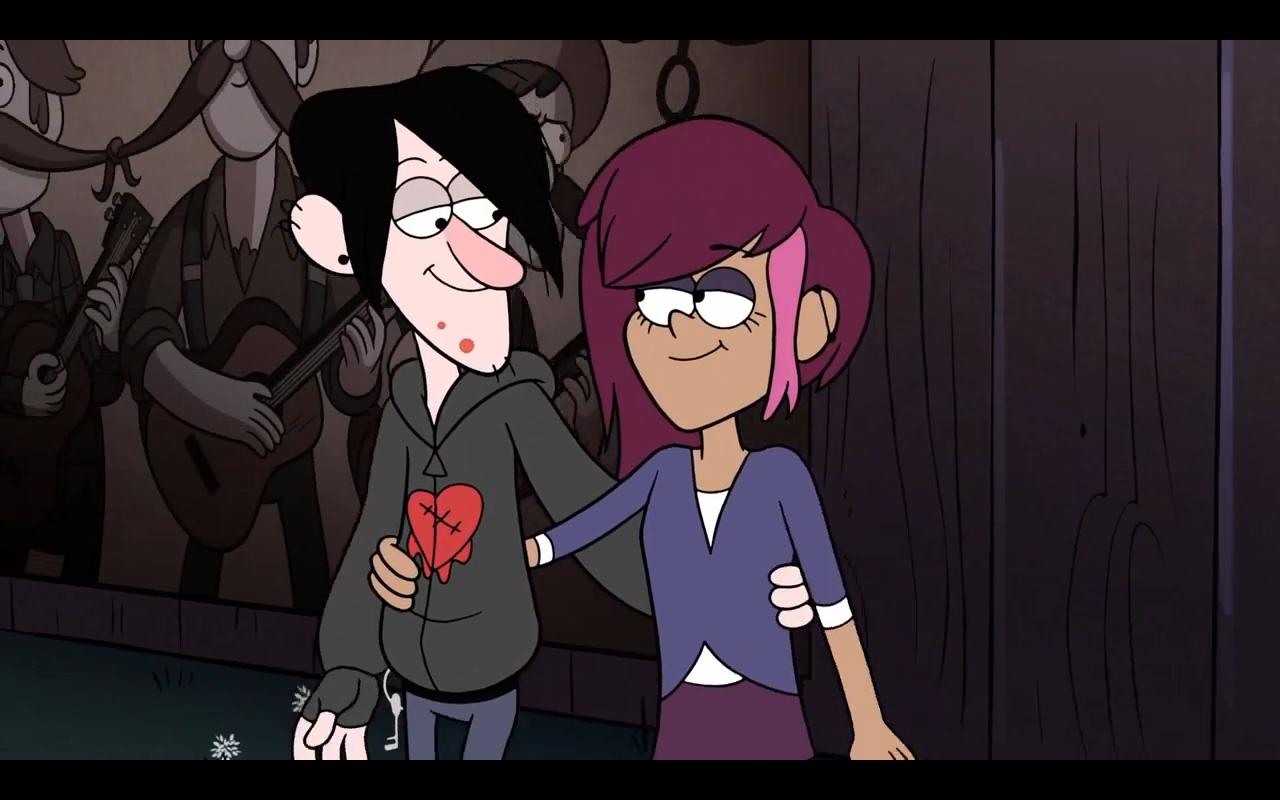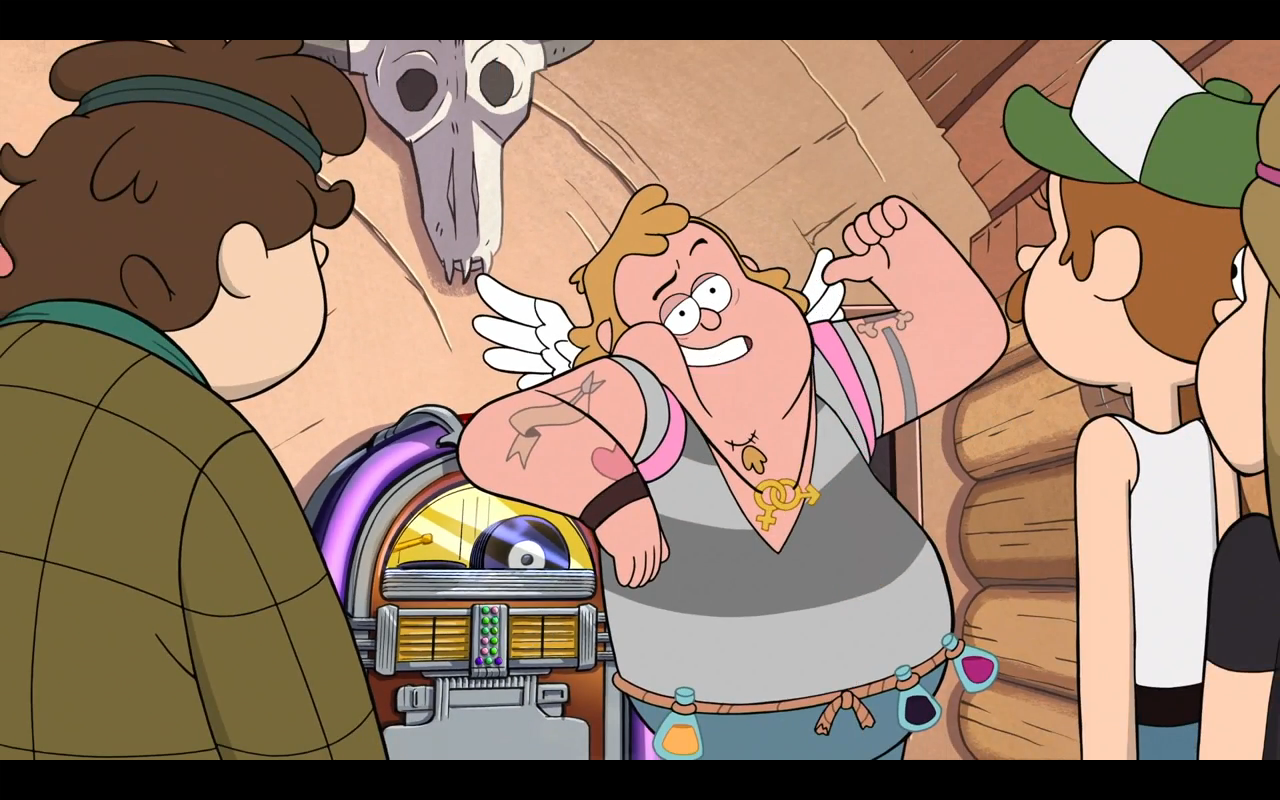 |
| Romance: the sweetest, yet the cruelest, of all emotions. |
Synopsis: Dipper, Mabel, Wendy, and the rest of the teens find Robbie in a graveyard, mourning his love life (or lack thereof). Imagining herself as a matchmaker, Mabel decides to examine the psyche of Robbie and get him into a love life. Her attempts to match Robbie up with mobilephile Tambry seem to fail, until she manages to procure (read: steal) a potion from a rocker who claims to be a Love God (voiced by John DiMaggio). The two fall in love, but also causes a row within the circle of teenagers.
Review (SPOILERS AHOY): Let's cut to the chase- this episode is among the weakest in the short history of this show, mainly because of the ending. But, let's save why for a bit later on.
This is the first episode written by Simpsons showrunner Josh Weinstein. He, alongside Bill Oakley, ran the last two "classic" seasons of The Simpsons, with episodes taking on a somewhat more "domestic" role, exploring the emotions of the characters and how they interact in the unit of Springfield. This is compared to the episodes run by David Mirkin previously, which tended to using the characters to place themselves in wacky situations that showed the problems of society, and Mike Scully thereafter, which tended more towards campy plots with characters (like Homer, Bart, Homer, Lisa, and Homer) inserted because celebrities are cool. This episode is indicative of Weinstein's run- it's by far the most "down to earth" episode this season, showing an exploration of characters within the town.
Last season, we saw a sizeable portion of the character focus go to the Pines family, with much of the rest going to the antagonists. The teenagers, the Average Joes and Janes of Gravity Falls, were often put in the background. Only Wendy and Robbie got anything approaching development; even then, they were largely denied the pathos that encompassed Stan, Dipper, and Mabel. This episode finally decides to delve into the characters of the teenagers.
The thing is, I might have been a bit too harsh in my review of "Boyz Crazy". Don't get me wrong- if Robbie meant to hypnotize Wendy, he deserved his punishment. However, if he didn't, he was merely an idiot that rivals Arnold Rimmer in terms of how pathetic he can be. He has no talent, is a coward, and tries to masquerade it with depictions of grandeur, such as faking songwriting and telling mind-erasing societies that he kicked the ass of a video game character. Beyond his image is that of a man who knows he's broken, who has locked himself out from the world.
Again, going back to "Boyz Crazy", how his breakup with Wendy affected him depends on your interpretation of the events of that episode. If Robbie meant to hypnotize Wendy, we see that Robbie made an attempt (albeit a horrible, callous, self-serving attempt) to maintain what he knew was a failing relationship, and may be regretting his deception (optimistically- pessimists may take the road that he was regretting the exposure of his failure). If he didn't, he realized that something horrible happened, he doesn't know what, and that life screwed with him.
Incredibly, Robbie's gothic tragedy contrasts starkly with his parents. Sure, Mr and Mrs Valentino appear to be chipper and happy. Yet, when you get down to it, they are almost sociopathic. They gleefully run a funeral home, smile when people appear to be on the verge of death, seem to ignore the troubles of their son... I could make a good case explaining that Robbie is rebelling against his parent's strange personalities by taking on an ironic gothic image- one that seems to rebel against society, yet one who runs on the id- this in deep contrast to his parents, who seem happy, yet seem moved by the cheques they get from running a funeral home in Gravity Falls.
The eponymous character in this episode, the Love God, is certainly one of the quirkier one-shot characters in the history of Gravity Falls. This personification of
We also see that Dipper finally has gelled with the crowd of teenagers, often falling into the same patterns of behavior and likes as the rest. Is it genuine? Or is it a mere attempt to blend in? I'll go with the former, but it is a decent question worth asking.
Mabel's romantic perspective is also thrown in a loop. Her viewpoint on love is a series of 80s rom-com cliches. She believes that love can occur with a "love potion", that love at first sight can exist, etc. This episode challenges the love at first sight, and she realizes the power that love can have, in both a destructive manner and a positive manner.
Now it seems like I'm giving this episode praise. So why, at the beginning of the episode, did I call it one of the weakest episodes of the series?
Unfortunately, Tambry is effectively relegated to a secondary player in the game of love. Sure, we get insights into her character via her interactions with Robbie, the sarcasm and the snark. Still, she remains an enigma, trapped in the cloud of her cell phone.
This episode also continues on a trend involving Mabel-centered plotlines- a majority of them have involved romance. Hopefully, this episode puts romance in Gravity Falls on the back burner, but given Mabel's goal is to have an "epic summer romance", I doubt it.
The rest of the teenagers also seem to be but mere pawns in the romantic subplot- a pretty weak attempt to create tension. Characters in Gravity Falls normally react less irrationally to situations like this, so why does this cause such a massive rift? I can write some of it off by explaining it as the destructive power of love, but I think Weinstein just needed tension.
Ending an episode without restoring the status quo is a risky maneuver. In this instance, I can't say that the writers succeeded that well. I mean, this episode has Robbie and Tambry hypnotized into loving each other, and it's not reversed. That's a tiny bit creepy. The reason? Because the concept of a love potion is creepy in and of itself. Why?
Well, Rick and Morty actually did a damn good exploration into the drawbacks of a love potion. In the episode "Rick Potion #9", probably my favorite episode of the show, Morty convinces Rick to make a potion, in order to get Jessica to fall in love with him. After that goes horribly wrong (read, almost everybody on earth is turned into Cronenburgs), Rick blasts Morty for even asking him to create the love potion, using the logic that the concept of a Love Potion is essentially a pseudo-date rape drug- essentially forcing the victim to fall in love with the applicant.
Granted, this episode used it's version of the love potion for two external people instead of using it in a "want this person to fall for me, so I'll use a love potion on her" manner. Also, it does provide a bit of irony that one relationship was brought down by hypnosis, while another one was kicked off by hypnosis. Still, that's a bit creepy.
Also, the ending of the "conflict" was also a bit disturbing. The teens are reunited by their mutual love of seeing Thompson as the center of the world's abuse- their picking fence. That's... a bit of a tragic, awkward ending... too awkward for me.
I think the biggest problem with this episode was that it tried a bit too hard to be a comedy-focused episode. Which is fine. After episodes focusing on parental abandonment, mind-erasure, abusive relationships, body theft, extreme nationalism, dangers in romance, and the dangers of ambition, a comedy-focused episode is certainly a necessary evil. Still, it seemed to come at the expense of potential character comedy.
Again, the fact that I could analyze Robbie and his parents as deeply as I could is pretty remarkable, given that this episode was pretty weak. That, and even the weakest Gravity Falls episode is still better than 85% of television.
But, it just didn't gel fantastically.
Who knows? I just think the reason why this episode was weak was because it was Weinstein's first episode. Hopefully, his next episode makes this look like a mere outlier on an otherwise pretty good record.
Tidbits:
- John DiMaggio is pretty much perfect as the Love God. DiMaggio, for those unaware, often voices id-based characters, such as Bender from Futurama and Jake from Adventure Time. It seems like the Love God was made especially for DiMaggio to voice.
- There was actually a subplot focusing on a local indie concert, with Stan trying to get "with the kids" at the concert... for the purpose of making money. I found the send-ups to Oregon-based culture pretty damn funny, and Stan's attempts to get a few extra bucks even funnier.
- Why, when the Love God used the "visions of heartbreak past", did it only show Mabel's crushes? There might be an answer. Is it implying that Dipper never had a crush until Wendy? Possibly. Is it also implying that Dipper is on good enough terms with Wendy that being let down wasn't heartbreak? Maybe... even though "Into the Bunker" still showed him quite solemn after Wendy let him down.
- Dear DisneyXD: Pick a timeslot and STICK TO IT!
- Interesting to note that this is the weakest episode of the season, and it's the 9th episode. Last season brought us the "Time Travelers Pig", the 9th episode of the 1st season, and that was my least favorite episode of the show up to that point. I really hope there isn't a "9th episode curse" developing.
- One last note: it appears we're entering another Gravity Falls drought. No episodes are scheduled for December, so far. If anything changes, I'll edit this.
Favorite Scene: Pretty much every second at the funeral home. Brilliant character analysis and pathos on both sides of the coin.
Least Favorite Scene: The ending of both the romantic plot and the friend breakup plot. Too awkward by half.
Score: 6.5.
(Edit 21/7/15: Score was originally 7. Adjusted down to 6.5. Partially done in hindsight, partially done just to make the scores better fit the reviews.)
(Edit 21/7/15: Score was originally 7. Adjusted down to 6.5. Partially done in hindsight, partially done just to make the scores better fit the reviews.)







